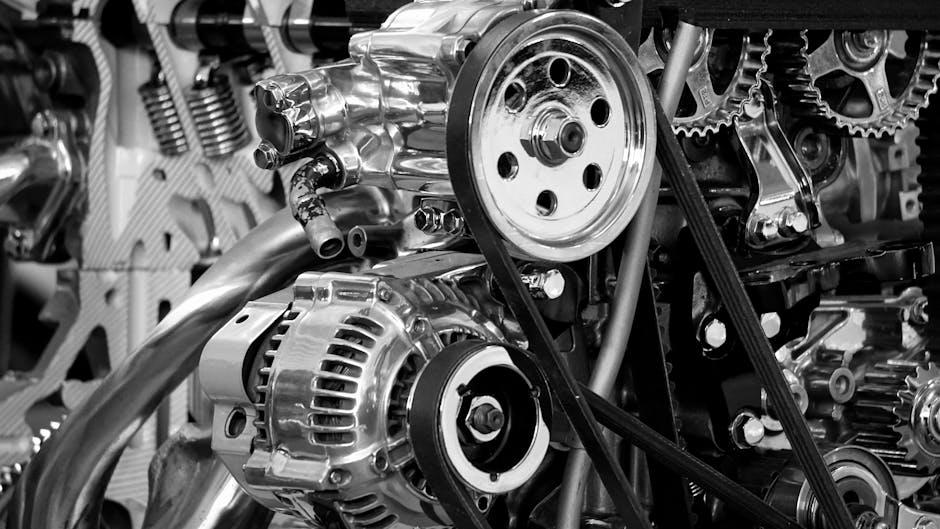Your vehicle’s transmission is the unsung hero of every journey, seamlessly shifting gears and delivering power from the engine to the wheels. Yet, despite its vital role, it often goes unnoticed—until something goes wrong. Knowing when to service your transmission isn’t just about sticking to a schedule; it’s about tuning in to the subtle signs your car sends and understanding how maintenance can save you from costly repairs down the road. In this article, we’ll explore the best times to give your transmission the attention it deserves, ensuring a smooth ride for miles to come.
Table of Contents
- Understanding the Role of Transmission Maintenance in Vehicle Longevity
- Identifying Common Signs That Indicate Transmission Service Is Needed
- Recommended Service Intervals Based on Vehicle Type and Usage
- The Impact of Driving Habits on Transmission Health and Service Frequency
- Choosing the Right Transmission Fluid and Filters for Optimal Performance
- Professional Transmission Inspection vs DIY Checks: What You Need to Know
- Q&A
- The Way Forward

Understanding the Role of Transmission Maintenance in Vehicle Longevity
Keeping your vehicle’s transmission in optimal condition is essential for ensuring a smooth driving experience and extending the lifespan of your car. Transmission maintenance doesn’t just prevent costly repairs—it actively safeguards the engine’s performance and fuel efficiency. Regular checks and servicing can identify early signs of wear, such as slipping gears or delayed engagement, which are often the first indicators that your transmission fluid is deteriorating or that internal components need attention.
Key benefits of consistent transmission care include:
- Enhanced vehicle longevity: Proper maintenance helps prevent breakdowns by addressing minor issues before they escalate.
- Improved fuel economy: Clean and well-lubricated transmission parts reduce friction and optimize power delivery.
- Better resale value: A well-documented transmission maintenance history appeals to prospective buyers.
| Maintenance Task | Recommended Frequency | Benefit |
|---|---|---|
| Transmission Fluid Change | Every 30,000 – 60,000 miles | Prevents overheating and fluid breakdown |
| Filter Replacement | Every 60,000 miles | Keeps contaminants out |
| Transmission Inspection | Annually | Identifies wear and leaks early |

Identifying Common Signs That Indicate Transmission Service Is Needed
Recognizing the warning signals your transmission is struggling is crucial for avoiding costly repairs down the line. Early signs often appear subtly, but ignoring them can lead to significant mechanical failure. One of the first indicators is delayed or rough shifting between gears, which can feel like a hesitation or sudden jerk. Additionally, unusual noises such as whining, clunking, or buzzing when the vehicle changes gears suggest internal wear. Keep an eye on transmission fluid as well—if it looks dark, smells burnt, or leaks onto your driveway, it’s time for a check-up.
Pay attention to how your vehicle responds when you accelerate or decelerate. If you notice slipping gears, where the car unexpectedly shifts to neutral or revs higher without acceleration, this signals an imminent problem. Other symptoms include warning lights flashing on your dashboard, especially the transmission temperature or check engine lights, which indicate that the system needs professional attention. Here’s a quick overview of common signs to watch out for:
- Difficulty shifting gears or delayed engagement
- Transmission fluid leaks underneath the vehicle
- Burning smell coming from the transmission
- Unusual noises during gear changes
- Transmission slipping or sudden power loss
- Dashboard warning lights related to transmission

Recommended Service Intervals Based on Vehicle Type and Usage
Transmission service intervals vary greatly depending on your vehicle type and how you use it daily. For sedans and standard passenger cars, manufacturers typically recommend transmission fluid changes every 30,000 to 60,000 miles. However, if your driving involves frequent stop-and-go traffic, heavy towing, or extreme temperature conditions, it’s wise to shorten this interval. SUVs and trucks, especially those engaged in towing or off-road activities, often require more frequent checks and fluid changes to prevent transmission wear and overheating.
Consider the following usage patterns and their suggested maintenance frequencies to keep your transmission running smoothly:
- Normal Driving: Fluid change every 45,000-60,000 miles
- Heavy Towing or Hauling: Every 30,000 miles or less
- City Driving (stop-and-go): Every 30,000-45,000 miles
- Off-Roading: Fluids and seals check every 20,000-30,000 miles
| Vehicle Type | Typical Interval | Heavy-Duty Usage Interval |
|---|---|---|
| Compact Cars | 50,000 miles | 30,000 miles |
| SUVs | 45,000 miles | 30,000 miles |
| Pickup Trucks | 40,000 miles | 25,000 miles |
| Luxury Vehicles | 60,000 miles | 40,000 miles |

The Impact of Driving Habits on Transmission Health and Service Frequency
Every driver’s habits directly influence how long a transmission stays in optimal condition. Aggressive driving, such as rapid acceleration, frequent hard braking, or towing heavy loads, can accelerate wear and tear on transmission components. On the other hand, smooth, steady driving helps maintain fluid circulation and reduces stress on gears and clutches. Recognizing these patterns helps vehicle owners anticipate when servicing is needed before costly repairs arise.
Consider the nature of your driving regularly to adjust your service schedule wisely. Frequent short trips where the transmission never fully warms up can lead to fluid contamination, while highway driving tends to be gentler on the system. Here’s a quick reference table showing how common driving styles affect transmission service intervals:
| Driving Habit | Service Frequency | Transmission Impact |
|---|---|---|
| Aggressive Driving | Every 25,000 miles | High wear on clutches and fluid degradation |
| City Stop-and-Go | Every 30,000 miles | Increased heat causing fluid breakdown |
| Highway Cruising | Every 50,000 miles | Lower stress and fluid degradation |

Choosing the Right Transmission Fluid and Filters for Optimal Performance
Choosing the correct transmission fluid and filters is crucial for maintaining your vehicle’s smooth shifting and prolonging the life of the transmission system. Not all fluids are created equal; manufacturers design specific formulations tailored to different types of transmissions, such as automatic, manual, or CVT. Using the wrong fluid can lead to poor performance or even severe damage. It’s essential to consult your owner’s manual or a trusted automotive expert to identify the fluid type that meets your vehicle’s specifications. Additionally, high-quality filters ensure contaminants stay out, preserving the integrity of your transmission components.
When selecting these components, consider factors like climate, driving habits, and vehicle age. For example:
- Synthetic fluids offer superior stability and resistance to breakdown in extreme temperatures.
- Conventional fluids are often more budget-friendly but may require more frequent changes.
- Filters vary in design; some trap microscopic debris better, boosting long-term performance.
| Component | Benefit | Ideal Usage |
|---|---|---|
| Synthetic Transmission Fluid | Enhanced heat resistance | Hot climates and heavy towing |
| Conventional Transmission Fluid | Cost-effective maintenance | Light-duty, everyday driving |
| Premium Transmission Filter | Better contaminant capture | Older transmissions or high-mileage vehicles |

Professional Transmission Inspection vs DIY Checks: What You Need to Know
While DIY transmission checks might seem convenient and budget-friendly, they often lack the comprehensive diagnostic capability of professional inspections. Home checks typically involve simple steps like monitoring fluid levels and looking for leaks, which are important but only scratch the surface. Professionals use advanced tools to analyze transmission performance, detect subtle issues like electronic sensor failures, and assess the overall mechanical health. This depth of insight is key to preventing costly breakdowns and ensuring smooth, long-term operation.
Key advantages of professional inspections include:
- Detailed fluid analysis for contamination and viscosity
- Computerized error code scanning
- Pressure and temperature testing
- Expert evaluation of wear and tear
In contrast, DIY checks are best suited for routine observation and basic troubleshooting but should never replace scheduled professional servicing. Think of DIY checks as early warning systems, and professional inspections as thorough health evaluations that keep your transmission performing optimally year-round.
Q&A
Q&A: When Should You Service Your Transmission?
Q1: Why is transmission maintenance important?
A1: Your vehicle’s transmission is the heart of its drivetrain—it ensures power from the engine reaches the wheels efficiently. Regular maintenance prevents costly repairs, improves performance, and prolongs the life of your car.
Q2: How often should I service my transmission?
A2: While manufacturers typically recommend servicing every 30,000 to 60,000 miles, the exact interval depends on your vehicle model, driving habits, and transmission type. Always consult your owner’s manual for specific guidance.
Q3: What are the signs that my transmission needs servicing?
A3: Keep an eye out for symptoms like slipping gears, delayed shifting, strange noises, burning smells, or fluid leaks. If your car hesitates before changing gears or the transmission fluid looks dark and smells burnt, it’s time for a checkup.
Q4: Can I check the transmission fluid myself?
A4: Yes! With your engine warm and running, locate the transmission dipstick, wipe it clean, reinsert, then check fluid level and color. Healthy fluid is typically bright red and clear; dark or cloudy fluid signals it needs replacing.
Q5: What does a transmission service usually include?
A5: A typical service involves draining old fluid, replacing the transmission filter, inspecting seals and gaskets, and refilling with fresh fluid. Some vehicles may require a flush to remove built-up debris.
Q6: Is it necessary to service automatic and manual transmissions differently?
A6: Yes. Manual transmissions typically use gear oil and may need less frequent service, while automatics rely on specialized transmission fluid that degrades faster. Understanding your transmission type ensures you follow the right maintenance routine.
Q7: Can delaying transmission service cause damage?
A7: Absolutely. Neglecting service can lead to overheating, worn-out gears, and complete transmission failure, often resulting in expensive repairs or replacement. Proactive care saves money and headaches down the road.
Q8: What role does driving style play in transmission health?
A8: Aggressive driving, frequent towing, or stop-and-go traffic adds strain on the transmission, making more frequent servicing beneficial. Gentle driving and regular maintenance keep it running smoothly longer.
Q9: Are there any special considerations for older vehicles?
A9: Older cars might require more attentive transmission care due to wear and tear. Regular fluid changes, inspections, and timely repairs can keep vintage models reliable and roadworthy.
Q10: When in doubt, who should I consult about transmission service?
A10: Trust a certified mechanic or your dealership service center. Their expertise and diagnostic tools help identify issues early and recommend the best service schedule tailored to your vehicle’s needs.
Regular transmission service isn’t just maintenance—it’s an investment in your vehicle’s longevity and your peace of mind. Stay ahead of trouble by knowing when to act!
The Way Forward
In the intricate dance of vehicle maintenance, knowing when to service your transmission is like tuning a vital instrument—it ensures smooth performance and longevity. By staying attentive to your transmission’s needs and following recommended service intervals, you’re not just avoiding costly repairs; you’re investing in the reliability and harmony of your driving experience. Remember, a well-serviced transmission doesn’t just move your car; it moves you forward with confidence.


487 Comments
v4p9on
v4p9on
cbrgka
8uw9sb
fy2c56
8fw1zp
l4dmbt
z0gxif
339bky
https://t.me/s/Online_1_xbet/830
https://t.me/s/Online_1_xbet/2816
https://t.me/s/Official_1xbet_1xbet
https://t.me/s/rating_online/5
https://t.me/s/rating_online/7
https://t.me/rating_online/1
https://t.me/s/rating_online/6
https://t.me/rating_online/4
https://t.me/rating_online/2
https://t.me/s/rating_online/1
https://t.me/rating_online/7
https://t.me/Online_1_xbet/3083
https://t.me/Online_1_xbet/3563
https://t.me/Online_1_xbet/1825
https://t.me/Online_1_xbet/2201
0myfio
https://t.me/Online_1_xbet/2740
https://t.me/Online_1_xbet/3429
https://t.me/Online_1_xbet/2036
https://t.me/Online_1_xbet/3169
https://t.me/Online_1_xbet/3496
https://t.me/Online_1_xbet/3485
https://t.me/Online_1_xbet/2854
https://t.me/Official_1xbet_1xbet/s/418
https://t.me/Official_1xbet_1xbet/s/1500
https://t.me/Official_1xbet_1xbet/s/515
https://t.me/Official_1xbet_1xbet/s/292
https://t.me/Official_1xbet_1xbet/s/105
https://t.me/Official_1xbet_1xbet/s/1323
https://t.me/Official_1xbet_1xbet/s/1077
https://t.me/Official_1xbet_1xbet/s/206
https://t.me/Official_1xbet_1xbet/s/1130
https://t.me/Official_1xbet_1xbet/s/1008
https://t.me/Official_1xbet_1xbet/s/1297
https://t.me/Official_1xbet_1xbet/s/1454
https://t.me/Official_1xbet_1xbet/s/1436
https://t.me/Official_1xbet_1xbet/s/545
https://t.me/Official_1xbet_1xbet/s/85
https://t.me/Official_1xbet_1xbet/s/1527
https://t.me/Official_1xbet_1xbet/s/271
https://t.me/Official_1xbet_1xbet/s/783
https://t.me/Official_1xbet_1xbet/s/1277
https://t.me/Official_1xbet_1xbet/s/1081
https://t.me/Official_1xbet_1xbet/s/1295
https://t.me/Official_1xbet_1xbet/s/170
https://t.me/Official_1xbet_1xbet/s/1391
https://t.me/Official_1xbet_1xbet/s/447
https://t.me/Official_1xbet_1xbet/s/807
https://t.me/Official_1xbet_1xbet/s/1510
https://t.me/Official_1xbet_1xbet/s/196
https://t.me/Official_1xbet_1xbet/s/1245
https://t.me/Official_1xbet_1xbet/s/1100
https://t.me/Official_1xbet_1xbet/s/474
https://t.me/Official_1xbet_1xbet/s/848
https://t.me/Official_1xbet_1xbet/s/971
https://t.me/Official_1xbet_1xbet/s/1484
https://t.me/Official_1xbet_1xbet/s/1011
https://t.me/Official_1xbet_1xbet/s/659
https://t.me/Official_1xbet_1xbet/s/596
https://t.me/Official_1xbet_1xbet/s/424
https://t.me/Official_1xbet_1xbet/s/776
https://t.me/Official_1xbet_1xbet/s/512
https://t.me/Official_1xbet_1xbet/s/163
https://t.me/Official_1xbet_1xbet/s/1172
https://t.me/Official_1xbet_1xbet/s/1156
https://t.me/Official_1xbet_1xbet/s/683
https://t.me/Official_1xbet_1xbet/s/540
https://t.me/Official_1xbet_1xbet/s/694
https://t.me/Official_1xbet_1xbet/1708
https://t.me/s/Official_1xbet_1xbet/1805
https://t.me/s/Official_1xbet_1xbet/1672
https://t.me/s/Official_1xbet_1xbet/1747
https://t.me/Official_1xbet_1xbet/1828
https://t.me/Official_1xbet_1xbet/1716
https://t.me/s/Official_1xbet_1xbet/1738
https://t.me/s/Official_1xbet_1xbet/1735
https://t.me/Official_1xbet_1xbet/1715
https://t.me/s/Official_1xbet_1xbet/1638
https://t.me/s/Official_1xbet_1xbet/1751
https://t.me/Official_1xbet_1xbet/1695
https://t.me/s/Official_1xbet_1xbet/1849
https://t.me/s/Official_1xbet_1xbet/1761
https://t.me/Official_1xbet_1xbet/1754
https://t.me/Official_1xbet_1xbet/1653
https://t.me/Official_1xbet_1xbet/1801
https://t.me/Official_1xbet_1xbet/1603
https://t.me/s/Official_1xbet_1xbet/1616
https://t.me/Official_1xbet_1xbet/1596
https://t.me/Official_1xbet_1xbet/1740
https://t.me/s/Official_1xbet_1xbet/1692
https://t.me/Official_1xbet_1xbet/1668
https://t.me/Official_1xbet_1xbet/1636
https://t.me/s/Official_1xbet_1xbet/1617
https://t.me/s/Official_1xbet_1xbet/1752
https://t.me/s/Official_1xbet_1xbet/1719
https://t.me/s/Official_1xbet_1xbet/1600
https://t.me/Official_1xbet_1xbet/1781
https://t.me/Official_1xbet_1xbet/1646
https://t.me/s/Official_1xbet_1xbet/1786
https://t.me/Official_1xbet_1xbet/1759
https://t.me/Official_1xbet_1xbet/1820
https://t.me/s/Official_1xbet_1xbet/1608
https://t.me/s/Official_1xbet_1xbet/1844
https://t.me/Official_1xbet_1xbet/1629
https://t.me/s/Official_1xbet_1xbet/1683
https://t.me/Official_1xbet_1xbet/1830
https://t.me/Official_1xbet_1xbet/1802
https://t.me/s/Official_1xbet_1xbet/1821
https://t.me/Official_1xbet_1xbet/1664
https://t.me/Official_1xbet_1xbet/1597
https://t.me/s/Official_1xbet_1xbet/1684
https://t.me/Official_1xbet_1xbet/1856
https://t.me/Official_1xbet_1xbet/1681
https://t.me/s/Official_1xbet_1xbet/1653
https://t.me/s/Official_1xbet_1xbet/1693
https://t.me/s/Official_1xbet_1xbet/1778
https://t.me/Official_1xbet_1xbet/1682
https://t.me/s/Official_1xbet_1xbet/1732
https://t.me/s/Official_1xbet_1xbet/1814
https://t.me/Official_1xbet_1xbet/1728
https://t.me/s/Official_1xbet_1xbet/1610
https://t.me/s/Official_1xbet_1xbet/1620
https://t.me/Official_1xbet_1xbet/1669
https://t.me/s/Official_1xbet_1xbet/1770
https://t.me/s/Official_1xbet_1xbet/1698
https://t.me/Official_1xbet_1xbet/1770
https://t.me/s/Official_1xbet_1xbet/1728
https://t.me/s/Official_1xbet_1xbet/1642
https://t.me/s/Official_1xbet_1xbet/1626
https://t.me/Official_1xbet_1xbet/1734
https://t.me/s/Official_1xbet_1xbet/1760
https://t.me/s/Official_1xbet_1xbet/1826
https://t.me/s/Official_1xbet_1xbet/1601
https://t.me/Official_1xbet_1xbet/1824
https://t.me/s/Official_1xbet_1xbet/1792
https://t.me/s/Official_1xbet_1xbet/1603
https://t.me/Official_1xbet_1xbet/1761
https://t.me/s/topslotov
uucv4u
[https://t.me/s/official_1win_aviator](https://t.me/s/official_1win_aviator)
https://t.me/s/reiting_top10_casino/2
https://t.me/s/reiting_top10_casino
https://t.me/s/reiting_top10_casino/5
https://t.me/s/reiting_top10_casino/10
https://t.me/reiting_top10_casino/8
https://t.me/reiting_top10_casino/7
https://t.me/s/reiting_top10_casino/4
https://t.me/reiting_top10_casino/6
https://t.me/s/reiting_top10_casino/8
https://t.me/reiting_top10_casino/4
https://t.me/s/reiting_top10_casino/3
https://t.me/s/reiting_top10_casino/6
https://t.me/reiting_top10_casino/9
https://t.me/reiting_top10_casino/2
https://t.me/reiting_top10_casino
https://t.me/reiting_top10_casino/10
https://t.me/reiting_top10_casino/3
https://t.me/s/reiting_top10_casino/9
https://t.me/reiting_top10_casino/5
https://t.me/s/reiting_top10_casino/7
https://t.me/s/Gaming_1xbet
https://t.me/s/PlayCasino_1win
https://t.me/s/PlayCasino_1xbet
https://t.me/s/PlayCasino_1xbet
https://t.me/s/PlayCasino_1win
https://t.me/s/ofitsialniy_1win/33/evith
https://t.me/s/iw_1xbet
https://t.me/s/Official_beefcasino
https://t.me/s/ofitsialniy_1win
https://t.me/bs_1xbet/29
https://t.me/bs_1xbet/18
https://t.me/bs_1xbet/49
https://t.me/bs_1xbet/27
https://t.me/s/bs_1xbet/39
https://t.me/s/bs_1xbet/8
https://t.me/bs_1xbet/2
https://t.me/s/bs_1xbet/44
https://t.me/bs_1xbet/7
https://t.me/bs_1xbet/12
https://t.me/bs_1xbet/23
https://t.me/s/bs_1xbet/24
https://t.me/s/bs_1xbet/10
https://t.me/s/bs_1xbet/34
https://t.me/s/bs_1xbet/19
https://t.me/bs_1xbet/34
https://t.me/bs_1xbet/37
https://t.me/bs_1xbet/18
https://t.me/bs_1xbet/5
https://t.me/s/bs_1xbet/5
https://t.me/bs_1xbet/3
https://t.me/s/bs_1xbet/17
https://t.me/bs_1xbet/7
https://t.me/bs_1xbet/5
https://t.me/s/bs_1xbet/21
https://t.me/s/bs_1xbet/23
https://t.me/bs_1xbet/4
https://t.me/s/bs_1xbet/21
https://t.me/bs_1xbet/15
https://t.me/s/bs_1xbet/8
https://t.me/bs_1xbet/7
https://t.me/bs_1xbet/16
https://t.me/s/bs_1xbet/39
https://t.me/s/bs_1xbet/39
https://t.me/s/bs_1xbet/42
https://t.me/bs_1xbet/15
https://t.me/bs_1xbet/46
https://t.me/bs_1xbet/15
https://t.me/s/bs_1xbet/23
https://t.me/bs_1xbet/39
https://t.me/s/bs_1xbet/7
https://t.me/s/bs_1xbet/7
https://t.me/s/jw_1xbet/967
https://t.me/jw_1xbet/974
https://t.me/s/jw_1xbet/83
https://t.me/s/jw_1xbet/878
https://t.me/jw_1xbet/899
https://t.me/s/jw_1xbet/662
https://t.me/s/bs_1Win/1094
https://t.me/s/bs_1Win/662
https://t.me/s/bs_1Win/635
https://t.me/s/bs_1Win/548
https://t.me/bs_1Win/322
https://t.me/s/bs_1Win/594
https://t.me/bs_1Win/365
https://t.me/s/bs_1Win/495
https://t.me/bs_1Win/394
https://t.me/s/bs_1Win/378
https://t.me/bs_1Win/332
https://t.me/bs_1Win/407
https://t.me/s/Official_mellstroy_casino/24
https://t.me/Official_mellstroy_casino/23
https://t.me/s/Official_mellstroy_casino/35
https://t.me/Beefcasino_rus/30
https://t.me/s/Official_mellstroy_casino/58
https://t.me/Official_mellstroy_casino/28
https://t.me/s/Official_mellstroy_casino/15
https://t.me/s/Official_mellstroy_casino/34
https://t.me/Official_mellstroy_casino/9
https://t.me/Official_mellstroy_casino/29
https://t.me/Official_mellstroy_casino/30
https://t.me/Official_mellstroy_casino/16
https://t.me/s/Official_mellstroy_casino/59
https://t.me/Official_mellstroy_casino/12
https://t.me/s/Best_promocode_rus/1256
https://t.me/s/Beefcasino_rus/57
https://t.me/s/ud_Legzo/53
https://t.me/ud_Flagman/55
https://t.me/ud_Monro/45
https://t.me/s/ud_Martin/51
https://t.me/s/ud_Jet/56
https://t.me/s/ud_Irwin/61
https://t.me/s/ud_DragonMoney/58
https://t.me/ud_Stake/52
https://t.me/s/ud_JoyCasino/58
https://t.me/ud_DragonMoney/55
https://t.me/ud_Kometa/53
https://t.me/ud_Kent/49
https://t.me/s/ud_Monro/44
https://t.me/s/ud_Fresh/64
https://t.me/ud_Fresh/56
https://t.me/ud_Rox/44
https://t.me/ud_JoyCasino/59
https://t.me/Beefcasino_rus/59
https://t.me/s/?ud_1Go/51
https://t.me/s/ud_Sol/56
https://t.me/ud_Drip/55
https://t.me/ud_Martin/57
https://t.me/ud_Kometa/63
https://t.me/s/ud_Vodka/61
https://t.me/ud_Flagman/47
https://t.me/s/ud_1xbet/46
https://t.me/s/ud_Gama/59
https://t.me/ud_Vodka/33
https://t.me/s/ud_MostBet/18
https://t.me/s/Beefcasino_rus
https://t.me/s/uD_soL
https://t.me/s/uD_1XBET
https://t.me/s/uD_ggbET
https://t.me/s/uD_MOSTBEt
https://t.me/s/Ud_monRo
https://t.me/s/uD_CASinO_X
https://t.me/s/official_1win_aviator/38
https://t.me/s/ud_1Go
https://t.me/s/ud_StaKe
https://t.me/official_1win_aviator/61
https://t.me/s/Ud_MRbiT
https://t.me/s/uD_dRagonMOneY
https://t.me/s/UD_KOmEtA
https://t.me/s/UD_lex
https://t.me/s/tf_1win
https://t.me/s/tf_1win
https://t.me/s/kfo_1win
https://t.me/official_1win_aviator/60
https://t.me/s/UD_DADdy
https://t.me/s/Ud_StarDa
https://t.me/s/ud_riObet
https://t.me/s/UD_PInco
https://t.me/s/UD_gGbET
https://t.me/s/ud_MRbIt
https://t.me/s/ud_CAsiNo_X
https://t.me/s/UD_DriP
https://t.me/s/UD_pokeRdOM
https://t.me/s/uD_mArTIN
https://t.me/s/uD_LEgzO
https://t.me/s/kef_R7
https://t.me/s/ke_Pokerdom
https://t.me/s/ke_Riobet
https://t.me/s/official_1win_aviator/149
https://t.me/s/ke_Pin_Up
https://t.me/s/ke_Pinco
https://t.me/s/ke_Drip
https://t.me/s/ke_kent
https://t.me/s/ke_Starda
https://t.me/s/ke_Jet
https://t.me/s/ke_Gizbo
https://t.me/s/kef_beef
https://t.me/s/ke_1Go
https://t.me/s/ke_1Win
https://t.me/s/ke_1xbet
https://t.me/s/ke_JoyCasino
https://t.me/s/ke_Martin
https://t.me/s/ke_Leon
https://t.me/s/ke_Irwin
https://t.me/s/ke_MostBet
https://t.me/s/kef_Rox
https://t.me/s/ke_CatCasino
https://t.me/s/ke_Casino_X
https://t.me/s/ke_Stake
https://t.me/s/ke_Volna
https://t.me/s/ke_PlayFortuna
https://t.me/s/ke_Booi
https://t.me/s/ke_Gama
https://t.me/s/ke_1xSlots
https://t.me/s/ke_GGBet
https://t.me/s/ke_Daddy
https://t.me/s/ke_Vulkan
https://t.me/s/ke_Monro
https://t.me/official_1win_aviator/36
https://t.me/s/ke_MrBit
https://t.me/official_1win_aviator/55
https://t.me/s/ke_mellstroy
https://t.me/s/ke_Fresh
https://t.me/s/topcasino_v_rossii
https://t.me/s/top_kazino_z
https://t.me/a_Top_onlinecasino/13
https://t.me/a_Top_onlinecasino/14
https://t.me/a_Top_onlinecasino/4
https://t.me/a_Top_onlinecasino/10
https://t.me/s/a_Top_onlinecasino/5
https://t.me/a_Top_onlinecasino/7
https://t.me/s/a_Top_onlinecasino/2
https://t.me/s/a_Top_onlinecasino/12
https://t.me/a_Top_onlinecasino/21
https://t.me/s/a_Top_onlinecasino/17
https://t.me/topcasino_rus/
https://t.me/s/official_Gizbo_ed
https://t.me/s/official_Pinco_ed
https://t.me/s/official_Lex_ed
https://t.me/s/official_Stake_ed
https://t.me/s/official_1xSlots_es
https://t.me/s/official_Gama_es
https://t.me/s/official_CasinoX_es
https://t.me/s/official_MostBet_es
https://t.me/s/official_DragonMoney_es
https://t.me/s/official_PlayFortuna_es
https://t.me/s/official_Volna_es
https://t.me/s/official_Kent_ed
https://t.me/s/official_Fresh_es
https://t.me/s/official_Riobet_ed
https://t.me/s/official_GGBet_ed
https://t.me/s/official_Irwin_ed
https://t.me/s/official_JoyCasino_es
https://t.me/s/official_Starda_es
https://t.me/s/official_R7_ed
https://t.me/s/official_Volna_ed
https://t.me/s/official_CatCasino_ed
https://t.me/s/official_Vodka_es
https://t.me/s/official_1xbet_ed
https://t.me/s/official_PinUp_ed
https://t.me/s/official_Monro_ed
https://t.me/PlayFortuna_egs/15
https://t.me/s/CatCasino_egs/11
https://t.me/s/iGaming_live/4541
https://t.me/JoyCasino_egs/8
https://t.me/s/Rox_egs/19
https://t.me/Gama_egs/12
https://t.me/PinUp_egs/15
https://t.me/GGBet_egs/8
https://t.me/Lex_egs/11
https://t.me/s/Volna_egs/3
https://t.me/s/CatCasino_egs/4
https://t.me/s/Sol_egs/18
https://t.me/Gizbo_egs/11
https://t.me/Gama_egs/11
https://t.me/MostBet_egs/6
https://t.me/s/PinUp_egs/5
https://t.me/s/Kometa_egs/15
https://t.me/Leon_egs/3
https://t.me/s/Rox_egs/9
https://t.me/s/Kometa_egs/14
https://t.me/s/CatCasino_egs/22
https://t.me/Kent_egs/11
https://t.me/Volna_egs/11
https://t.me/PlayFortuna_egs/11
https://t.me/s/Kometa_egs/17
https://t.me/va_1xbet/20
https://t.me/s/iGaming_live/4636
https://t.me/s/va_1xbet/18
https://t.me/s/va_1xbet/13
https://t.me/va_1xbet/13
https://t.me/s/va_1xbet/19
https://t.me/va_1xbet/10
https://t.me/s/va_1xbet/20
https://t.me/va_1xbet/17
https://t.me/va_1xbet/11
https://t.me/s/va_1xbet/15
https://t.me/va_1xbet/6
https://t.me/va_1xbet/16
https://t.me/va_1xbet/3
https://t.me/s/va_1xbet/16
https://t.me/s/surgut_narashchivaniye_nogtey/17
https://t.me/s/surgut_narashchivaniye_nogtey/11
https://t.me/surgut_narashchivaniye_nogtey/16
https://t.me/ah_1xbet/20
https://t.me/ah_1xbet/16
https://t.me/ah_1xbet/9
https://t.me/s/ah_1xbet/13
https://t.me/ah_1xbet/19
https://t.me/ah_1xbet/15
https://t.me/ah_1xbet/18
https://t.me/s/ah_1xbet/7
https://t.me/s/ah_1xbet/2
https://t.me/s/ah_1xbet/9
https://t.me/s/ah_1xbet/8
https://t.me/ah_1xbet/13
https://t.me/s/Best_rating_casino
https://t.me/s/reyting_topcazino/18
https://t.me/topcasino_rus/
https://t.me/a_Topcasino/10
https://t.me/top_ratingcasino/3
https://t.me/a_Topcasino/8
https://t.me/top_ratingcasino/6
https://t.me/top_ratingcasino/9
https://t.me/a_Topcasino/3
https://t.me/top_ratingcasino/10
https://t.me/a_Topcasino/4
https://telegra.ph/Top-kazino-11-14-2
https://t.me/s/kazino_bez_filtrov
https://t.me/kazino_bez_filtrov
https://t.me/da_1xbet/14
https://t.me/da_1xbet/11
https://t.me/da_1xbet/4
https://t.me/da_1xbet/10
https://t.me/da_1xbet/5
https://t.me/da_1xbet/6
https://t.me/da_1xbet/13
https://t.me/da_1xbet/3
https://t.me/Best_promocode_rus/2945
https://t.me/da_1xbet/12
https://t.me/da_1xbet/15
https://t.me/rq_1xbet/736
https://t.me/rq_1xbet/786
https://t.me/rq_1xbet/1397
https://t.me/s/rq_1xbet/1313
https://t.me/s/rq_1xbet/1125
https://t.me/s/rq_1xbet/1347
https://t.me/s/rq_1xbet/1151
https://t.me/s/rq_1xbet/944
https://t.me/Official_1xbet1/524
https://t.me/s/Official_1xbet1/820
https://t.me/s/Official_1xbet1/940
https://t.me/Official_1xbet1/355
https://t.me/Official_1xbet1/600
https://t.me/s/Official_1xbet1/1100
https://t.me/Official_1xbet1/200
https://t.me/Official_1xbet1/78
That’s a fascinating point about blending tradition with modern entertainment! Platforms like bigbunny online casino really seem to be embracing cultural authenticity – a unique approach I appreciate. It’s more than just games, right? It’s about community & connection.
That’s a fascinating point about blending tradition with modern entertainment! Platforms like bigbunny online casino really seem to be embracing cultural authenticity – a unique approach I appreciate. It’s more than just games, right? It’s about community & connection.